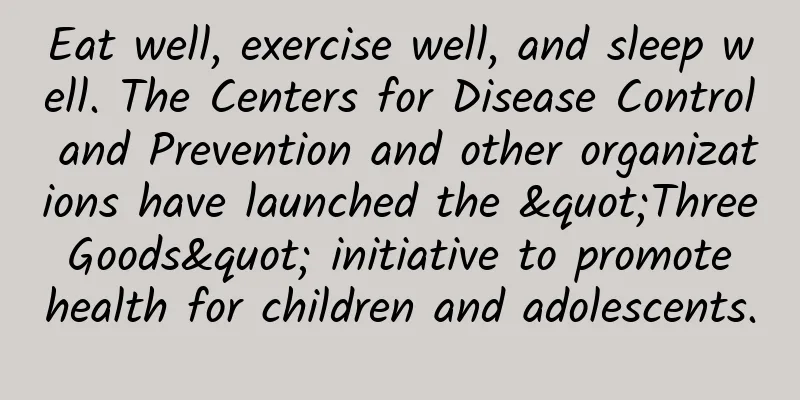"Health from eating" series | People with high blood lipids should control cholesterol and saturated fat, please remember these dietary reminders

|
Abnormal blood lipids are a problem for many people. Not only is the proportion of middle-aged and elderly people with abnormal blood lipids very high, but in recent years, the number of young and middle-aged people with abnormal blood lipids has also increased sharply. According to the "Report on the Nutrition and Chronic Disease Status of Chinese Residents (2020)", the proportion of dyslipidemia among adult residents aged 18 and above in my country is as high as 35.6%. This includes high triglycerides, high total cholesterol, high low-density lipoprotein cholesterol and low high-density lipoprotein cholesterol, and many people are in a state where two, three or even four of these items are exceeded at the same time. In most cases, people refer to these conditions as high blood lipids. Although high blood lipids may seem harmless, this condition is associated with the risk of chronic diseases such as hypertension, diabetes, coronary heart disease, and stroke. Simply put, abnormal blood lipids often indicate that our metabolic capacity is declining, our physiology is aging, and our eating and living habits are unhealthy, all of which are related to an increased risk of various chronic diseases. The "Dietary Guidelines for Hyperlipidemia" released by the National Health Commission this year put forward 8 suggestions for people with abnormal blood lipids. The guidelines suggest that people should "be able to look and choose wisely" and choose food intelligently. But people should not only eat enough protein, but also limit cholesterol and saturated fat. So how should they eat? Indeed, for people with hyperlipidemia, they should not only control the total amount of fat in their diet, but also control saturated fat. For people with normal blood cholesterol levels, the recommended amount of dietary cholesterol is less than 300 mg per day; for people with high total cholesterol and low-density lipoprotein cholesterol, they should also control their daily cholesterol intake to less than 200 mg. It should be noted that the response to dietary cholesterol varies from person to person. Some people have strong body adjustment ability, and after eating cholesterol, the liver synthesis decreases, and the blood cholesterol level remains unchanged; while others are more sensitive to cholesterol in food. Therefore, it is best to pay attention to monitoring the blood lipid response after eating high-cholesterol foods for a period of time. How should saturated fat be controlled? 1. Do not use animal oils for cooking, including butter, lard, tallow, mutton fat, etc. Do not use palm oil or coconut oil. Although palm oil and coconut oil are plant-derived oils, the proportion of saturated fatty acids in them is as high as half and 80% respectively. 2. Try to eat less baked goods such as biscuits, cookies, cakes, egg tarts, puff pastry, snacks such as potato chips, rice crusts, sachima, and various layered pastries and snacks. 3. Choose low-fat milk, and eat less high-end ice cream, high-end popsicles, and cold drinks covered with chocolate. 4. Avoid fatty meat, high-fat meat, use less minced fat, and remove the skin from chicken and duck. The saturated fat content of ruminant meat such as cattle and sheep is particularly high, followed by pork, chicken and duck. 5. Try to eat less processed meat products. How to control dietary cholesterol? 1. Eat fresh poultry eggs, avoid eggs with added salt or alkali, and stale braised eggs. 2. Limit the amount of egg yolks, or choose eggs that are low in cholesterol and high in omega-3 fatty acids. 3. Limit the intake of animal offal and avoid eating too much fish roe, crab roe and other parts that are particularly high in cholesterol. 4. Control the total amount of meat, fish and shrimp you eat, and choose varieties with relatively low cholesterol. 5. Cook meat and eggs containing cholesterol and fat together with soy products. (Author: Registered dietitian, Professor Fan Zhihong from the School of Food Science and Engineering, China Agricultural University) |
<<: World No Tobacco Day | It's never too late to quit smoking!
Recommend
Many people are unconsciously doing this kind of behavior that deeply backstabs and hurts themselves! Stop it now!
If you want to make someone suffer, betrayal is t...
[Smart Farmers] Don’t be careless: Food poisoning caused by this bacteria often tops the list
[Smart Farmers] Don’t be careless: Food poisoning...
Can I eat daylily in early pregnancy?
People should not eat day lily in the early stage...
Why do girls have cold and sweaty hands and feet?
What girls hate most is winter. It is cold in win...
The downside of getting angry during your period
During menstruation, many female friends will fin...
What is the nutritional value of tenderloin? What types of tenderloin are there?
The nutritional value of tenderloin, protein. Por...
Can induced labor be used for malpositioned fetuses?
Pregnancy is a very difficult thing, and expectan...
50 days after delivery, I have some bleeding again. What's going on?
Under normal circumstances, there will be no blee...
Tencent: Tencent's 1Q20 financial report shows that social, gaming and enterprise services are in full swing during the pandemic
According to Tencent's 1Q20 financial report,...
What is the authentic Sichuan boiled fish recipe? Should the cucumber for boiled fish be sliced or striped?
The predecessor of boiled fish is actually the ho...
What to do if you have lower abdominal pain after medical abortion
Medical abortion can cause lower abdominal pain b...
How to get the first flu shot in autumn? China Centers for Disease Control and Prevention names 8 groups of people
Friends may have discovered that there are so man...
Do you know the harm of drinking coffee for a long time?
Coffee is often drunk by many people in daily lif...
Is it harmful to use mercury to fill teeth? What materials are safe and strong for filling teeth?
In life, as people's eating habits become mor...
Cervical cancer vaccine for women
Cervical cancer vaccine, also known as HPV vaccin...









